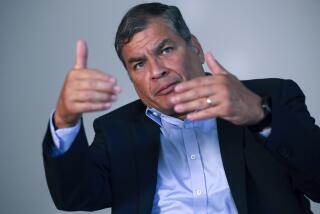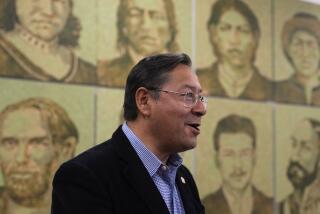Ecuador soldiers rescue president amid revolt by police
- Share via
Reporting from Quito, Ecuador, and Bogota, — Amid volleys of gunfire and concussion grenade blasts, Ecuadorean armed forces Thursday night rescued President Rafael Correa from a hospital where he had been held for several hours against his will by police mutineers.
The rescue ended a 12-hour standoff between the government and dissident police officers who shoved Correa and threw tear gas canisters at him Thursday morning when he arrived at a north Quito police barracks to confront protesters upset over his veto of legislation that would have given police better benefits and salaries.
Overcome by gas and with an injured knee, Correa was taken to a nearby police hospital for treatment.
Police protesters followed him, surrounded the hospital and set off more tear gas, blocking government officials and Correa supporters from gaining access to the area.
Before his dramatic rescue by soldiers, Correa told a radio reporter that the protesting police had attempted a coup against his government. He said he was essentially being held hostage and that his government would not negotiate with the protesting police until they let him leave.
“While I am here, there is nothing to discuss,” Correa told a state-run TV station from inside the hospital. “I won’t sign anything under pressure. I’ll die before that.”
Addressing thousands of supporters from the presidential Carondelet Palace in downtown Quito after the rescue, Correa thanked the armed forces and said he was shedding “tears of sadness for the Ecuadorean blood” shed during the operation.
There were reports that at least two police officers were killed and several other people wounded during the rescue.
Correa blamed former president and opposition leader Lucio Gutierrez for inciting the police to mutiny.
A national state of emergency had been declared earlier in the day after at least one person was reported killed and more than 70 injured in unrest resulting from the police protests, which took place in several Ecuadorean cities. The lawlessness sparked scattered violence, looting and robberies across the nation.
Quito’s international airport was closed Thursday as dissident air force members also joined the protest. Highways across the country were blocked by police.
As the crisis dragged on, the role of Ecuador’s armed forces came under scrutiny. The military’s chief of staff, Gen. Ernesto Gonzalez, had pledged support for Correa, but some observers noted the immediate lack of action by the military during the hospital blockade.
Local reports said Correa would not order a rescue operation because he feared further bloodshed.
As the situation unfolded through the day, leaders from across the Americas threw their support behind the Ecuadorean leader.
In solidarity with Correa, Peru and Colombia closed their borders with Ecuador.
In Washington, the Organization of American States called an emergency session to deal with the crisis and passed a resolution supporting Correa. U.S. Secretary of State Hillary Rodham Clinton and most Latin American presidents issued declarations of support for him and urged the police to return the country to normalcy.
Venezuelan President Hugo Chavez, a close political ally of Correa, sent messages over his Twitter social networking account that “they are trying to overthrow President Correa. Be on alert countries of the Bolivarian alliance.”
Ecuador long has suffered from unstable governments. At his inauguration in 2007, Correa was the seventh president in a decade.
Bertha Garcia, a military history professor at Pontifical Catholic University in Quito, said the mutiny did not appear to be a “prepared” coup attempt but a spontaneous reaction of “poorly paid police who never in their decades of existence had risen up like this.”
Special correspondents Rosero reported from Quito and Kraul from Bogota.
More to Read
Sign up for Essential California
The most important California stories and recommendations in your inbox every morning.
You may occasionally receive promotional content from the Los Angeles Times.










